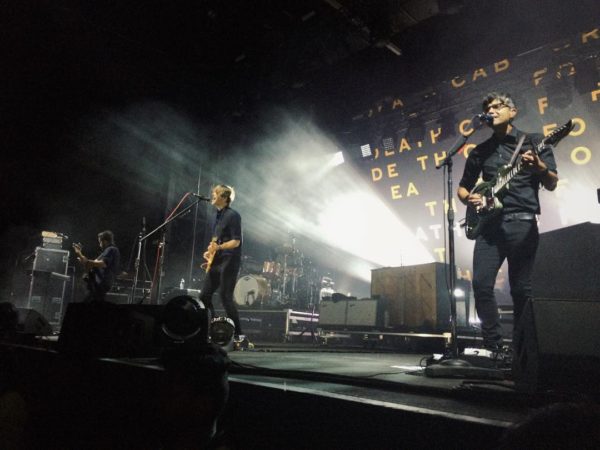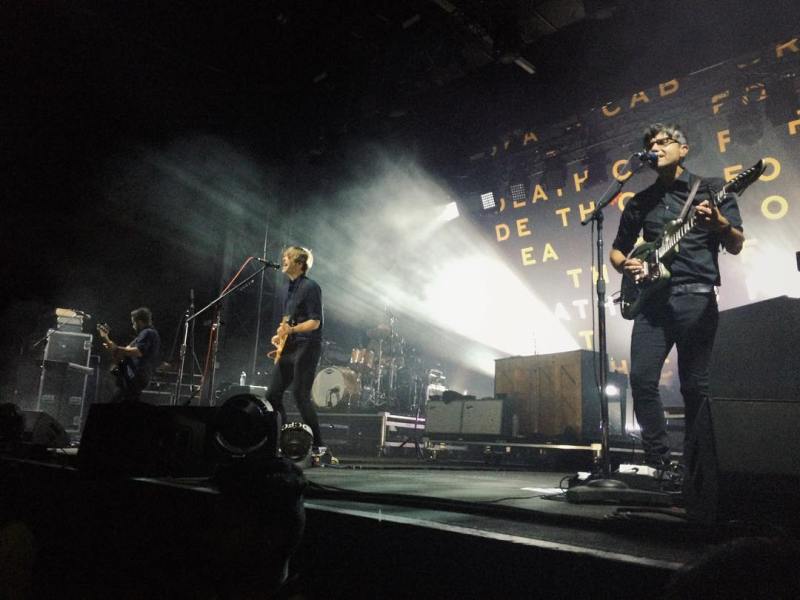
What indie-rock song from the late ’90s and early 2000s goes best with the contemporaneous work of American novelist Jonathan Franzen? It’s a somewhat obscure question that has long preoccupied me and probably few others, but I’m convinced the answer is important to understanding the spirit of that moment in American history and culture just before 9/11. Franzen picks up on a set of themes shared by some indie-rock bands making music around the same time, but by a year or so after 9/11, the angsty lo-fi renaissance of ’90s indie was over, and the rest of the decade saw indie-rock become more commercial and less anxious.
What was that moment in American music and letters, and why was it so short-lived? Looking at the shift in indie-rock that happened around that time might provide a hint to what exactly changed in the American psyche to those who, like me, were not old enough to remember much of life before the change.
The novels of Jonathan Franzen, besides being compulsively readable, are compelling because they promise to present something substantial about the spirit of the period in which they were written. Franzen’s breakthrough novel, “The Corrections,” was published 10 days before 9/11 and, like so much else from that period, it is easy to read into it both an innocence and a morbid anticipation of incipient terror. Consider the first lines of the novel: “The madness of an autumn prairie cold front coming through. You could feel it: Something terrible was going to happen.”
“The Corrections” follows the lives of the children of a Midwestern family as they find themselves discontented amid material success. A banker, a sought-after chef and a tenured professor, the family’s three children each find themselves wracked by various sorts of anxieties and can’t seem to help sabotaging themselves. There was something cursed about the seemingly prosperous world of the late nineties, Franzen seems to suggest. Among the miracle drugs and tech startups, the age of America’s unchallenged global dominance, a decade of uninterrupted economic growth, there was a sort of deathly-ness which, Franzen seems to think, can best be appreciated through a study the lives of those sensitive unfortunates whose boats were not lifted by the rising economic tide.
These same themes can be noted more broadly in ’90s lo-fi rock, in the work of the bands who set the groundwork for the 2000s indie-rock boom: Superchunk, Sleater-Kinney, Guided by Voices, Pixies, Pavement, etc. Superchunk’s song “Late-Century Dream,” off the album “Here’s to Shutting Up,” released a week after 9/11, seems to epitomize both the transition from the indie-rock of the ’90s to the indie-rock of the 2000s, and this kind of paranoiac malaise that characterizes the end of the ’90s in the immediate lead-up to 9/11. Another song on the album, “Phone Sex,” was supposedly left off set lists on the album’s promotion tour due to a line that seemed altogether too close to home: “Plane crash footage on TV/I know, I know that could be me.”
“Late-Century Dream,” with its eerie synth backdrop, features a line crooned in that sheepish, over-enunciated style we now associate primarily with Death Cab for Cutie vocalist Ben Gibbard: “But everybody grows up weaned on some sick late-century dream/Or the happy face on a shirt smiling, ‘shop till you drop,’ yeah.” The line speaks, however, to an angst that’s broader than that of Gibbard’s songs of breakups and distance. Superchunk, like Franzen, seemed conscious that the fabric of some innocent, deadly dream was coming apart in their America.
Wilco, though they come from a slightly different background in the alt-country rock scene, address similar themes of disaster and cynicism on their two landmark albums from this period, 1999’s “Summerteeth” and 2001’s “Yankee Hotel Foxtrot.” “Tall buildings shake/Voices escape singing sad, sad songs,” goes the chorus of their hit song “Jesus, Etc.” The song “She’s a Jar” depicts an outwardly happy family that hides – even to themselves – the signs of an abusive relationship. Wilco and Franzen share, furthermore, a Midwestern connection that seems somehow to lead them to highlight the disparity between happy appearances and desperate realities – as does, for example, the movie “Fargo” from the same period.
This emphasis on angst, hollowness and anxiety does not seem to last very far after 2001’s close. The indie bands that dominated the charts for the decade of the 2000s – Death Cab for Cutie, the Shins, the Strokes, to name a few – may have been the direct descendants of Superchunk’s angsty generation of bands, but their work seems largely to have failed to address the same themes of societal anxiety. Death Cab’s breakup anthems, the Shins’ sunny pop hooks, the Strokes’ undirected brashness made for compelling fare many of us listened to through high school, but a sense of national desolation is most often absent.
We could attribute any number of causes to this shift. Maybe the countercultural aspects of indie rock simply suffered as it entered the mainstream. Now that the Death Cab generation of bands has decisively exited the spotlight, we’ve recently witnessed the return of rawness and angst in the music of Car Seat Headrest and others.
Alternatively, maybe the political events of the early 2000s may have made such a doomy prophecy seem either trite or treasonous. Disaster was not simply a vague, menacing idea; it was real, and musings about its possibility would have seemed extremely improper. At the same time, America was engaged in a war abroad which quickly made notions of moral innocence a thing of the past, leaving songwriters and novelists little to parody.
Whatever the cause, the sense of anxiety about American prosperity, and the anticipation of disaster in a superficially serene world is something that characterizes American letters and music in the late ’90s – and not the early 2000s. Looking back on the music and novels of 20 years ago opens a window into a foreign land of trepid innocence. For people like me who weren’t socially conscious at the time, making these sorts of inquiries is vital to being able to understand what changed between then and now – and therefore to understanding the shape of the present.
Contact Nick Burns at njburns ‘at’ stanford.edu.
